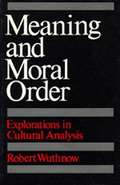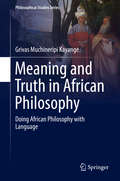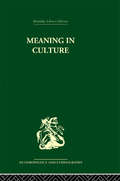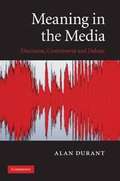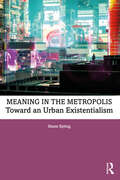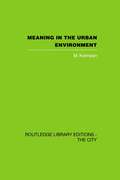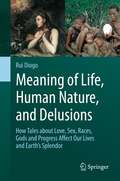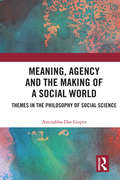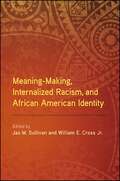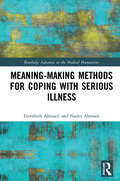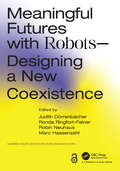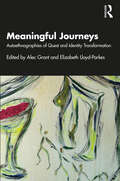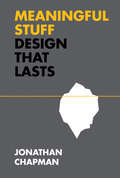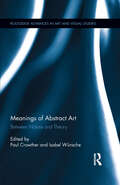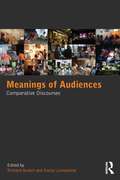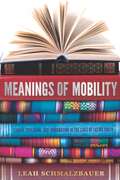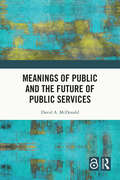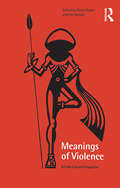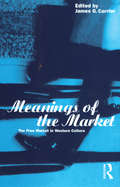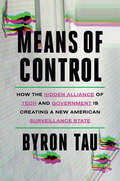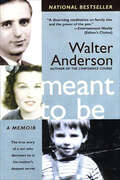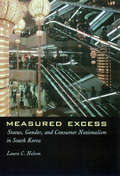- Table View
- List View
Meaning and Action: Community Planning and Conceptions of Change (Routledge Revivals)
by Peter MarrisFirst published in 1987, Meaning and Action’s central theme is the difficulty of matching an understanding of social problems to effective strategies, in a time of endemic fiscal constraints and profound changes in economic structure. Peter Marris explores the relationship between the way we conceive problems and the possibilities of action by examining two British policies – the National Community Development Project and the redevelopment of London’s dockland. Drawing on both American and British experiences and policies, Marris shows how, as community planners and organizers became disillusioned with the assumptions underlying existing policies, they searched for a more comprehensive understanding of urban social structure. At the same time, this understanding became almost impossible to translate into practicable strategies of action. The book sets this analysis into a broader framework, showing how the pressures of inflation, rising taxes and unemployment undermined a liberal conception of urban policy and the supportive context it had provided for more radical improvements. It illuminates the ideological dilemma underlying the emergence of the Thatcher and Reagan administrations and the disarray of leftwing political parties. The final chapters discuss the alternative, new conceptions of social theory that are emerging and examines how the metaphors we use to represent social reality, such as structure or reproduction, can help or hinder our ability to re-integrate meaning and action.
Meaning and Moral Order
by Robert WuthnowGoing beyond classical, neoclassical, and poststructural theories of culture, this innovative, controversial, challenging book will compel scholars to rethink many of the assumptions on which the study of ideology, ritual, religion, science, and culture have been based.
Meaning and Truth in African Philosophy: Doing African Philosophy with Language (Philosophical Studies Series #135)
by Grivas Muchineripi KayangeThis book offers a new way of doing African philosophy by building on an analysis of the way people talk. The author bases his investigation on the belief that traditional African philosophy is hidden in expressions used in ordinary language. As a result, he argues that people are engaging in a philosophical activity when they use expressions such as taboos, proverbs, idioms, riddles, and metaphors. The analysis investigates proverbs using the ordinary language approach and Speech Act theory. Next, the author looks at taboos using counterfactual logic, which studies the meaning of taboo expressions by departing from a consideration of their structure and use. He argues that the study of these figurative expressions using the counterfactual framework offers a particular understanding of African philosophy and belief systems. The study also investigates issues of meaning and rationality departing from a study on riddles, explores conceptual metaphors used in conceptualizing the notion of politics in modern African political thought, and examines language and marginalization of women and people with disabilities. The book differs from other works in African philosophy in the sense that it does not claim that Africans have a philosophy as is commonly done in most studies. Rather, it reflects and unfolds philosophical elements in ordinary language use. The book also builds African Conception of beauty and truth through the study of language.
Meaning in Culture
by F. Allan HansonMeaning in Culture discusses the question of whether 'culture' refers to some superorganic entity that exists in its own right, or is only convenient short-hand for the shared beliefs and behaviour of human individuals. It also investigates the problem of relativism and explores the question of whether anthropology and the other social sciences are really scientific. First published in 1975.
Meaning in the Media
by Alan DurantMeaning in the Media addresses the issue of how we should respond to competing claims about meaning put forward in confrontations between people or organisations in highly charged circumstances such as bitter public controversies and expensive legal disputes. Alan Durant draws attention to the pervasiveness and significance of such meaning-related disputes in the media, investigating how their 'meaning' dimension is best described and explained. Through his analysis of deception, distortion, bias, false advertising, offensiveness and other kinds of communicative behaviour that trigger interpretive disputes, Durant shows that we can understand both meaning and media better if we focus in new ways on moments in discourse when the apparently continuous flow of understanding and agreement breaks down. This lively and contemporary volume will be invaluable to students and teachers of linguistics, media studies, journalism and law.
Meaning in the Metropolis: Toward an Urban Existentialism
by Shane EptingThis book will benefit readers by revealing how urban existence is a multifaceted affair that, once examined, will forever change the way they think about their place in the city and what it means to live in one.Engaging in urban existentialism requires interrogating the idea of “The City,” delving into the facets of its conception. The lights, sounds, exquisite buildings, art, culture, and, most importantly, the endless possibilities entice people. They are where your wildest dreams of love, success, and happiness can come true. Yet, reality can stymie those aspirations. However, if you can make it there, you can make it anywhere. The reason is that many urban places, as hypercompetitive networks of socio-material arrangements, test you at every turn. They mold urban dwellers into adaptable beings who can survive the torment of traffic, bad weather, displeasing persons, and grueling work—all before lunch. Despite such complexity, what we want is probably simple: people to love, to be loved, a safe place to call home, good food, acceptance of oneself, and the ability to pursue a fulfilling existence through work and recreation. Like cities, nothing is that simple. Examining the built environment reveals competing interests between several stakeholder groups, and how each person relates to others remains at the center of such an enterprise. Questioning one’s place among others is at the heart of this book, and it can help you find meaning in the metropolis.Meaning in the Metropolis will interest philosophers, graduate students, maverick urban planners, and city lovers looking for meaning in the places they call home.
Meaning of Life, Human Nature, and Delusions: How Tales about Love, Sex, Races, Gods and Progress Affect Our Lives and Earth's Splendor
by Rui DiogoWhatever are your beliefs, background, education, political views or interests, one thing is sure: this book will engage you, teach you something new, and more importantly make you to re-think deeply about critical aspects of your daily-life, including sex, love, food, physical activities, diseases, work and stress, and how you see and deal with other people, other animals, and the planet in general. Indeed, it focuses on topics that have fascinated people from all places and historical periods since times immemorial: Why are we here? What is the meaning of life? Are we progressing, and will we thrive? It does this by integrating in a unique fashion information from ancient Greek, Sumerian, Hindu, Jewish, Buddhist, Christian and Muslim texts to high-tech brain research, facts about near-death experiences, Covid-19, QAnon conspiracies, virtual reality and dating aps; from Adam and Eve to the rise of misogyny and racism to Black Lives Matter, Me-Too, Hollywood romantic movies and Disney fairy-tales. Contrary to notions about 'human progress' and 'Homo Deus' defended by authors such as Harari, Pinker and Dawkins, it shows that human history instead involves the repetition of similar imaginary tales created by a combination of traits found in other animals and the uniquely human obsession about 'cosmic purpose' stories related to our awareness of death's inevitability. Organized religions appeared later, chiefly during the rise of agriculture and 'civilizations'. Diogo navigates mesmerizing untold stories revealing a paradox: these events and the industrial 'revolution' increased inequality, oppression, slavery, subjugation of women, famines, plagues, 'work', stress, and suicides. Data from psychology, biology, neurobiology, and cross-cultural studies of hunter-gatherers and so-called 'developed' societies reveal an even more profound paradox: within all forms of life, the 'sapient being' is the one immersed in Neverland's world of unreality - truly a Homo irrationalis, fictus and socialis believing in fictional tales about cosmic 'duties', 'romantic meant to be', demons, inferior 'races' and 'genders', conspiracies, and 'justified' slavery, warfare, genocides, and animal abuses. Importantly, such tales play, on the other hand, crucial functions such as help coping with death and a plethora of societal troubles, decreasing stress, or preventing drug and alcohol abuse. An optimist and passionate wondered and wanderer, Diogo provides enthralling details about the history of religion, discrimination, romantic love, warfare, diseases and Earth's biodiversity illustrating how 'virtue is in the middle' and that we - with our intriguing combination of beliefs, bodily needs and desires, artistic abilities, and mismatches between our senses' illusions and the cosmos' reality - are not 'better' or 'worse' than the other millions of captivating living species. This powerful and urgently needed message has critical repercussions for how we understand, care about, and mindfully enjoy living in this splendid planet, in the reality of here and now.Pre-publication comments: "I applaud the enormous work that Diogo has invested in this follow-up to his widely acclaimed Evolution driven by organismal behavior book, and the challenge of getting people to think beyond and outside of our usual set of definitions and expectations. The case-studies provided in the book are fascinating and insightful" (Drew Noden, Award-winning Emeritus Professor, Cornell University)"Rui Diogo is becoming the Slavoj Zizek of evolutionary biology" (Marcelo Sanchez-Villagra, Director of the Paleontological Institute and Museum of the University of Zurich)
Meaning, Agency and the Making of a Social World: Themes in the Philosophy of Social Science
by Amitabha Das GuptaThis book explores a vital but neglected element in the philosophy of social science – the complex nature of the social world. By a systematic philosophical engagement, it conceives the social world in terms of three basic concerns: epistemic, methodological and ethical. It examines how we cognize, study and ethically interact with the social world. As such, it demonstrates that a discussion of ethics is epistemically indispensable to the making of the social world. The book presents a new interpretation of philosophy of social science and addresses a series of related topics, including the role of the human subject in the context of scientific knowledge, objectivity, historicity, meaning and nature of social reality, social and literary theory, scientific methodology and fact/value dichotomy, human and collective agency and the limits to relativism. Examining each in turn, it argues that the social world is constructed through human actions and becomes significant because we ascribe meaning to it. This is organized around discussions on the meaning, agency and the making of a social world. The book will be useful to scholars and researchers of philosophy of social science, political philosophy and sociology.
Meaning-Making, Internalized Racism, and African American Identity (SUNY series in African American Studies)
by Jas M. Sullivan William E. Cross Jr.Focusing on the broad range of attitudes Black people employ to make sense of their Blackness, this volume offers the latest research on racial identity. The first section explores meaning-making, or the importance of holding one type of racial-cultural identity as compared to another. It looks at a wide range of topics, including stereotypes, spirituality, appearance, gender and intersectionalities, masculinity, and more. The second section examines the different expressions of internalized racism that arise when the pressure of oppression is too great, and includes such topics as identity orientations, self-esteem, colorism, and linked fate. Grounded in psychology, the research presented here makes the case for understanding Black identity as wide ranging in content, subject to multiple interpretations, and linked to both positive mental health as well as varied forms of internalized racism.
Meaning-making Methods for Coping with Serious Illness (Routledge Advances in the Medical Humanities)
by Nader Ahmadi Fereshteh AhmadiThis book provides an alternative, complementary approach to the existing conventional approaches to religious and spiritually oriented coping. By focusing on the role of culture, the authors take into account the methods employed by a vast number of people who do not directly identify themselves as religious. The empirical data used in this book derive from studies conducted in several countries; Sweden, China, South Korea, Turkey and Malaysia, across which religion plays a different role in the social and cultural life of individuals. This approach and these empirical data are unique and allow comparisons to be made between different cultural settings. By introducing the concept of meaning-making coping, the authors explore the influence of culture on choice of coping methods, be they purely religious, spiritual or existential. The term "existential meaning-making coping" is used to describe coping methods that are related to existential questions; these methods include religious, spiritual and existential coping methods. Meaning-making Methods for Coping with Serious Illness contributes to new approaches and theoretical models of coping. As such it is an invaluable resource for health care, medical, public health and sociology students and researchers. It will also be of interest to educators and policy-makers working in the area of health.
Meaningful Futures with Robots: Designing a New Coexistence (Chapman & Hall/CRC Artificial Intelligence and Robotics Series)
by Marc Hassenzahl Judith Dörrenbächer Ronda Ringfort-Felner Robin NeuhausSoon, robots will leave the factories and make their way into living rooms, supermarkets, and care facilities. They will cooperate with humans in everyday life, taking on more than just practical tasks. How should they communicate with us? Do they need eyes, a screen, or arms? Should they resemble humans? Or may they enrich social situations precisely because they act so differently from humans? Meaningful Futures with Robots: Designing a New Coexistence provides insight into the opportunities and risks that arise from living with robots in the future, anchored in current research projects on everyday robotics. As well as generating ideas for robot developers and designers, it also critically discusses existing theories and methods for social robotics from different perspectives - ethical, design, artistical and technological – and presents new approaches to meaningful human-robot interaction design. Key Features: Provides insights into current research on robots from different disciplinary angles with a particular focus on a value-driven design. Includes contributions from designers, psychologists, engineers, philosophers, artists, and legal scholars, among others.
Meaningful Journeys: Autoethnographies of Quest and Identity Transformation
by Alec Grant Elizabeth Lloyd-ParkesMeaningful Journeys is an edited collection of autoethnographies underpinned by the conceptual, philosophical, and etymological origins of ‘journeying,’ ‘questing,’ and traditional and modern understandings of ‘pilgrimage.’The volume contains chapters on the ways in which all these concepts intersect with identity and identity transformation. These range across narratives of sport; adventure; preferred identity; curative religion; revered location; nostalgia; grief resolution; ‘out of suitcase’ travels; and pilgrimage journeys understood in more traditional senses. The collection showcases and promotes the identity transformational quest as an important conceptual nuance of narrative autoethnography. Readers will engage with the ways in which contributing authors craft their emerging selves into preferred identities, which showcase personal and relational change in action.This book is essential reading for students and practitioners of autoethnography and qualitative research internationally and others interested in identity transformation in narrative inquiry.
Meaningful Philanthropy: The Person Behind the Giving
by Adrian Sargeant Jen ShangWith unparalleled access to some of the world’s most reflective and thoughtful philanthropists, this book explores the philanthropic journeys of 48 high net worth individuals (HNWIs) and ultra-high net worth individuals (UHNWIs) to uncover the person behind the giving. Their stories reveal the difference between the meaning they experience and the impact their philanthropy makes. Through the lens of philanthropic psychology, the authors examine how philanthropists experience their giving and the psychological challenges they need to overcome. This fascinating book provides a unique guide for new and experienced philanthropists and their trusted advisers and fundraisers in the creation of more meaningful philanthropic experiences.
Meaningful Stuff: Design That Lasts (Design Thinking, Design Theory)
by Jonathan ChapmanAn argument for a design philosophy of better, not more.Never have we wanted, owned, and wasted so much stuff. Our consumptive path through modern life leaves a wake of social and ecological destruction--sneakers worn only once, bicycles barely even ridden, and forgotten smartphones languishing in drawers. By what perverse alchemy do our newest, coolest things so readily transform into meaningless junk? In Meaningful Stuff, Jonathan Chapman investigates why we throw away things that still work, and shows how we can design products, services, and systems that last. Obsolescence is an economically driven design decision--a plan to hasten a product's functional or psychological undesirability. Many electronic devices, for example, are intentionally impossible to dismantle for repair or recycling, their brief use-career proceeding inexorably to a landfill. A sustainable design specialist who serves as a consultant to global businesses and governmental organizations, Chapman calls for the decoupling of economic activity from mindless material consumption and shows how to do it.Chapman shares his vision for an "experience heavy, material light" design sensibility. This vital and timely new design philosophy reveals how meaning emerges from designed encounters between people and things, explores ways to increase the quality and longevity of our relationships with objects and the systems behind them, and ultimately demonstrates why design can--and must--lead the transition to a sustainable future.
Meaningless Citizenship: Iraqi Refugees and the Welfare State
by Sally Wesley BonetA searing critique of the &“freedom&” that America offers to the victims of its imperialist machinations of war and occupation Meaningless Citizenship traces the costs of America&’s long-term military involvement around the world by following the forced displacement of Iraqi families, unveiling how Iraqis are doubly displaced: first by the machinery of American imperialism in their native countries and then through a more pernicious war occurring on U.S. soil—the dismantling of the welfare state.Revealing the everyday struggles and barriers that texture the lives of Iraqi families recently resettled to the United States, Sally Wesley Bonet draws from four years of deep involvement in the refugee community of Philadelphia. An education scholar, Bonet&’s analysis moves beyond the prevalent tendency to collapse schooling into education. Focusing beyond the public school to other critical institutions, such as public assistance, resettlement programs, and healthcare, she shows how encounters with institutions of the state are an inherently educative process for both refugee youths and adults, teaching about the types of citizenship they are expected to enact and embody while simultaneously shaping them into laboring subjects in service of capitalism. An intimate, in-depth ethnography, Meaningless Citizenship exposes how the veneer of American values—freedom, democracy, human rights—exported to countries like Iraq, disintegrates to uncover what is really beneath: a nation-state that prioritizes the needs of capitalism above the survival and wellbeing of its citizens.
Meanings of Abstract Art: Between Nature and Theory (Routledge Advances in Art and Visual Studies)
by Paul Crowther Isabel WünscheTraditional art is based on conventions of resemblance between the work and that which it is a representation "of". Abstract art, in contrast, either adopts alternative modes of visual representation or reconfigures mimetic convention. This book explores the relation of abstract art to nature (taking nature in the broadest sense—the world of recognisable objects, creatures, organisms, processes, and states of affairs). Abstract art takes many different forms, but there are shared key structural features centered on two basic relations to nature. The first abstracts from nature, to give selected aspects of it a new and extremely unfamiliar appearance. The second affirms a natural creativity that issues in new, autonomous forms that are not constrained by mimetic conventions. (Such creativity is often attributed to the power of the unconscious.) The book covers three categories: classical modernism (Mondrian, Malevich, Kandinsky, Arp, early American abstraction); post-war abstraction (Pollock, Still, Newman, Smithson, Noguchi, Arte Povera, Michaux, postmodern developments); and the broader historical and philosophical scope.
Meanings of Audiences: Comparative Discourses
by Sonia Livingstone Richard ButschIn today’s thoroughly mediated societies people spend many hours in the role of audiences, while powerful organizations, including governments, corporations and schools, reach people via the media. Consequently, how people think about, and organizations treat, audiences has considerable significance. This ground-breaking collection offers original, empirical studies of discourses about audiences by bringing together a genuinely international range of work. With essays on audiences in ancient Greece, early modern Germany, Soviet and post-Soviet Russia, Zimbabwe, contemporary Egypt, Bengali India, China, Taiwan, and immigrant diaspora in Belgium, each chapter examines the ways in which audiences are embedded in discourses of power, representation, and regulation in different yet overlapping ways according to specific socio-historical contexts. Suitable for both undergraduate and postgraduate students, this book is a valuable and original contribution to media and communication studies. It will be particularly useful to those studying audiences and international media.
Meanings of Mobility: Family, Education, and Immigration in the Lives of Latino Youth
by Leah SchmalzbauerOver the past twenty years, elite colleges and universities have enacted policies that have reshaped the racial and class composition of their campuses, and over the past decade, Latinos’ college attendance has notably increased. While discussions on educational mobility focus on its perceived benefits – that it will ultimately lead to social and economic mobility – less attention is paid to the process of “making it” and the challenges low-income youth experience when navigating these elite spaces. In Meanings of Mobility, sociologist Leah C. Schmalzbauer explores the experiences of low-income Latino youth attending highly selective, elite colleges. To better understand these experiences, Schmalzbauer draws on interviews with 60 low-income Latino youth who graduated or were set to graduate from Amherst College, one of the most selective private colleges in the United States. The vast majority of these students were the first in their immigrant families to go to college in the U.S. She finds that while most of the students believed attending Amherst provided them with previously unimaginable opportunities, adjusting to life on campus came with significant challenges, both to the new physical and social environments. Many of the students Schmalzbauer spoke with had difficulties adapting to the new cultural norms at Amherst as well as relating to their non-Latino, non-low-income peers. The challenges these students faced were not limited to life on campus. As they attempted to adapt to Amherst, they felt gaps form between themselves and the family and friends they left behind who could not understand the new hardships they were facing. The students credited their elite education for access to extraordinary educational and employment opportunities. However, their experiences while at Amherst and afterward revealed that the relationship between educational and social mobility is much more complicated and less secure than popular conversations about the “American Dream” suggest. They found that their educational attainment was not enough to erase the core challenges of growing up in a marginalized immigrant family: many were still poor, faced racism, and those who were undocumented or had undocumented family members still feared deportation. Schmalzbeauer provides several suggestions to elite institutions to better support low-income Latino students and lower the emotional price of educational mobility. These suggestions include creating immigration offices on campus that develop programming and supports for undocumented students and undocumented family members. She also recommends educating staff to better understand the centrality of family for these students and the challenges they face, so staff will be able to provide appropriate support and advice. Additionally, she suggests incentivizing more privileged students to take courses to better understand inequality and the experiences of their marginalized peers. Meanings of Mobility provides compelling insights into the lesser-studied difficulties faced by low-income Latinos pursuing educational and social mobility.
Meanings of Public and the Future of Public Services
by David A. McDonaldCritically assessing meanings of the term ‘public’, this book situates the emergence and expansion of ‘public services’ within market-based forms of production and consumption. It highlights the potential for making public services more progressive within market societies, but underscores their ongoing capture by private interests and emphasises the inherent limits of reform within a ‘bourgeois public sphere’. The author explores opportunities for more expansive forms of non-marketized public services, examining emerging debates on the theory and practice of equitable, participatory and sustainable forms of publicness that go beyond mere ownership. The book then asks how we can build a robust international ‘pro-public’ movement that juggles universal needs with local context. With a focus on essential public services such as water, electricity and health, the text is global in its scope and written for a broad audience. It will be useful for those interested in social and public policy, public services and public administration, political theory, economic geography, social movements, sustainability and development.
Meanings of Violence: A Cross-Cultural Perspective
by Göran Aijmer; Jon AbbinkThere are good reasons to look at violence from new perspectives. In its endless manifestations violence is part and parcel of human existence, and is very probably a constituting element of human society. And yet violent action - warfare, penalties, insults, feuding, assault, murder, rape, suicide, sports - remains in all its complexity one of the least understood fields of human social life.The book's contributors identify the symbolic and ritualized aspects of violence, and suggest ways of 'reading' violence as it occurs in the world, whether as violent duelling and age-group violence in Southern Ethiopia, bullfighting in Iberia, cattle rustling in Kenya, guerrilla and militia wars in Colombia, or public executions in China.These case studies suggest that 'violence' is not a simple, universal urge, but is contingent and context-dependent, shaped by social relations of power, force and dominance. To be the victim of violence is a humiliating and frightening experience. But the many ambiguities that occur in the use of violence must be considered, to understand why peace seems only to exist as a contrast to the violation of peace.
Meanings of the Market: The Free Market in Western Culture (Explorations in Anthropology)
by James G. CarrierFor almost twenty years, the 'Free Market' has been a central feature of public debate in the West, Eastern Europe and elsewhere. In the name of the Market and its supposed benefits, governments and international agencies have imposed massive changes on peoples' lives. Curiously, scholars have paid little attention to the ways that the idea of the Market is invoked, to what it might mean and how it is being used. This book helps correct that state of affairs. Focusing on the United States, where the Market model is strongest, authors analyze portrayals of the Market, its values and the people within it, as a way of teasing out its assumptions and contradictions. They also describe extensions and practical applications of the Market model in policy-making in the United States and in explaining how firms work, show its political strengths and conceptual limitations. In bringing rigor and sustained critical analysis to a topic of growing global significance, this truly interdisciplinary study represents a coherent and incisive contribution to anthropology, sociology, politics, history and economics, as it challenges these disciplines to come to grips with one of the most potent cultural symbols of postmodernity.
Means of Control: How the Hidden Alliance of Tech and Government Is Creating a New American Surveillance State
by Byron TauYou are being surveilled right now. This sweeping exposé reveals how the U.S. government allied with data brokers, tech companies, and advertisers to monitor us through the phones we carry and the devices in our home.&“A revealing . . . startling . . . timely . . . fascinating, sometimes terrifying examination of the decline of privacy in the digital age.&”—Kirkus Reviews&“That evening, I was given a glimpse inside a hidden world. . . . An entirely new kind of surveillance program—one designed to track everyone.&”For the past five years—ever since a chance encounter at a dinner party—journalist Byron Tau has been piecing together a secret story: how the whole of the internet and every digital device in the world became a mechanism of intelligence, surveillance, and monitoring.Of course, our modern world is awash in surveillance. Most of us are dimly aware of this: Ever get the sense that an ad is &“following&” you around the internet? But the true potential of our phones, computers, homes, credit cards, and even the tires underneath our cars to reveal our habits and behavior would astonish most citizens. All of this surveillance has produced an extraordinary amount of valuable data about every one of us. That data is for sale—and the biggest customer is the U.S. government.In the years after 9/11, the U.S. government, working with scores of anonymous companies, many scattered across bland Northern Virginia suburbs, built a foreign and domestic surveillance apparatus of breathtaking scope—one that can peer into the lives of nearly everyone on the planet. This cottage industry of data brokers and government bureaucrats has one directive—&“get everything you can&”—and the result is a surreal world in which defense contractors have marketing subsidiaries and marketing companies have defense contractor subsidiaries. And the public knows virtually nothing about it.Sobering and revelatory, Means of Control is the defining story of our dangerous grand bargain—ubiquitous cheap technology, but at what price?
Meant To Be: A Memoir
by Walter AndersonPublished to strong reviews and major media attention, this heartfelt and inspirational rags-to-riches memoir by the highly regarded CEO of Parade Publications tells the emotional story of how he came to terms with an identity and a family that he never knew he had until he reached middle age.Meant To Be begins when Anderson, a 21-year-old Marine returns from service to say goodbye to his dying father and tries to find the answer to a question that has inexplicably haunted him from his earliest years: Was the alcoholic, abusive man who has so tormented him in his childhood his real father? Shockingly, the answer turns out to be "No." Unbeknown to him, at least until that point, his mother, a German Protestant, fell in love during World War II with a Russian Jew and bore his child. Anderson learns this information as a young man but he and his mother keep this secret for another 35 years, until the day Anderson—now an unusually successful publishing executive—meets an unknown brother who, it turns out, has lived a nearly parallel life. Meant To Be is a love story, a journey of self-discovery and spirituality, and a provocative challenge to common notions about the role of heredity in our lives.
Measured Excess: Status, Gender, and Consumer Nationalism in South Korea
by Laura C. NelsonMeasured Excess: Status, Gender, and Consumer Nationalism in South Korea.

